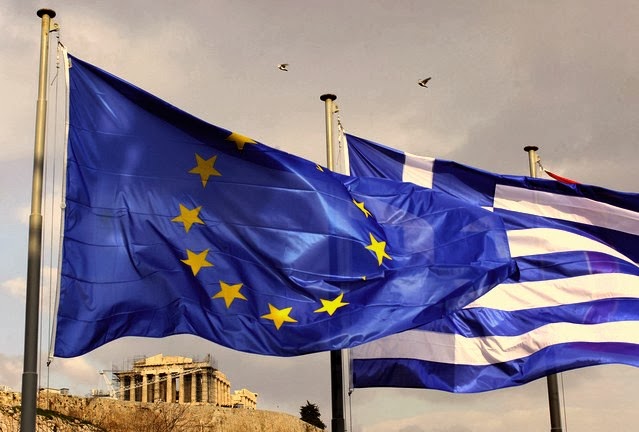Photo: Menelaos Myrillas/ SOOC
Anastasia Balezdrova
A day after the European elections in Greece that the radical left SYRIZA party won by a 4% margin, its leader Alexis Tsipras called for early elections. The ruling New Democracy and PASOK began reckoning in terms of the election results, already considering their next actions, some of the parties are licking their wounds and others, such as the new "To Potami" movement reported a very good election premiere with two MEPs.
What developments can SYRIZA’s victory lead to, albeit not so strong? Why didn’t a large part of the Greek citizens vote confidence in it and how will the government respond to this vote? Political scientist Plamen Tonchev explains the consequences of the results of Sunday's vote before GRReporter.
 "Apparently SYRIZA did not achieve its greatest and most ambitious goal, which was to overthrow the government and give rise to early elections. It is already clear that, at least at this stage, the radical left does not inspire confidence in the public as an alternative to the present government. On the other hand, SYRIZA can reasonably claim that it is currently the largest party in the country with a lead of almost 4%. SYRIZA will be represented in the European Parliament by six MEPs and it is particularly interesting that Kostadinka Kuneva will be one of them. Moreover, SYRIZA won in a number of municipalities and in two regions, including the largest one, which is Attica. All these things are positive for the radical left. In conclusion, I would say that, despite its internal contradictions, SYRIZA is establishing itself on the political stage. The question however is whether the radical left, which has risen in times of a severe crisis, will be able to formulate a meaningful and convincing strategy for Greece’s emergence from this crisis. In a sense, the party is a "child" of the crisis but an important question that remains in force is whether it will be able to take Greece out of it.
"Apparently SYRIZA did not achieve its greatest and most ambitious goal, which was to overthrow the government and give rise to early elections. It is already clear that, at least at this stage, the radical left does not inspire confidence in the public as an alternative to the present government. On the other hand, SYRIZA can reasonably claim that it is currently the largest party in the country with a lead of almost 4%. SYRIZA will be represented in the European Parliament by six MEPs and it is particularly interesting that Kostadinka Kuneva will be one of them. Moreover, SYRIZA won in a number of municipalities and in two regions, including the largest one, which is Attica. All these things are positive for the radical left. In conclusion, I would say that, despite its internal contradictions, SYRIZA is establishing itself on the political stage. The question however is whether the radical left, which has risen in times of a severe crisis, will be able to formulate a meaningful and convincing strategy for Greece’s emergence from this crisis. In a sense, the party is a "child" of the crisis but an important question that remains in force is whether it will be able to take Greece out of it.
Obviously, New Democracy lost some of the votes it received two years ago. On the other hand, the parliamentary elections at the time were extremely polarized and then the bet was whether Greece would remain in the eurozone. That is, the question at the time concerned the economic stability of the country whereas yesterday, the majority of Greek citizens voted for political stability.
This is especially true for PASOK, which has changed its name to Elia. The fact that it has not collapsed shows that the voters prefer political stability through today's government. They are not ready for the involvement of the country in mishaps and political experiments with SYRIZA.
The true winner in the elections, however, is Golden Dawn, which we must admit. This was clear last Sunday, after the first round of the local elections, as well as yesterday. Firstly, Golden Dawn is establishing its presence as a third political force despite all the trials and despite the fact that its leaders are in prison. Secondly, at least one of its sympathizers has become a regional governor, namely Theodoros Karipidis in Western Macedonia region, although he ran as an independent candidate.

Moreover, it is clear that Golden Dawn exerts influence on the other parties, albeit indirectly. For example, it is clear that it won votes to the detriment of Independent Greeks. It is clear that it influenced the rhetoric of many of the candidates, as was the case with New Democracy candidate for Athens mayor Aris Spiliotopoulos, when he took the position of Golden Dawn on the issue of building a mosque. I.e. Golden Dawn is increasingly establishing itself. This is unpleasant as a fact but we should account for it.
Independent Greeks and Democratic Left suffered significant losses. The first lost two-thirds of the votes compared to the 10% it had won in May 2012. It fell to 3.4% of the votes. Obviously, Independent Greeks that spontaneously originated on Facebook in early 2012 as a movement of discontented citizens has no strong foundations as a party structure nor does it have a specific vision for Greece’s future.
For its part, Democratic Left paid dearly for the indecision on the part of leader Fotis Kouvelis and for the lack of any meaningful strategy.

A very interesting phenomenon is Stavros Theodorakis’ "To Potami" movement that deserves to be considered. It is one of the few positive developments, an optimistic tone in the election results. Its initiative to provoke, immediately after the elections, a discussion on the necessary changes in the state structure and the economic model of Greece is anticipated with interest. In my opinion, the most important thing is that "To Potami" can attract the passive and demoralized citizens and return them to the political process.
The criticism that the movement has not yet submitted its political platform is reasonable. And I think voters need to be aware of the parliamentary group in the European Parliament to which they send the candidates supported by them. As far as I understand, the Regulation of the European Parliament does not require this but it would be wise to have clarity on this issue. I do not know who will be the MEPs of "To Potami" but if they were George Gramatikakis and Miltiadis Kirkos who seem to have won the highest number of votes, at least so far, I think it would be more logical for them to join the group of European Socialists. I really do not know how "To Potami" will take such an important decision but in all cases, they claim they will make it and announce it soon.

Although SYRIZA has failed to achieve the percentage with which to overthrow the government, the ruling coalition is not at all sustainable. The fact that PASOK has not collapsed, as they say, is largely due to the blackmailing or the threats on the part of Evangelos Venizelos to the voters, namely that they must vote for Elia if they do not want the government to fall. It is obvious that this move proved successful. I spoke with people who were willing to vote for "To Potami" but preferred Elia at the last minute, precisely because they feared that the cabinet could fall. Therefore, I am saying that, ultimately, the citizens have preferred political stability.
To analyze the results of the vote we should take into account the gradually fading rhetoric of the "memorandum - anti-memorandum" dilemma. I think Greece is entering a new stage, and the time has passed for all the political forces that emerged and grew because of the memorandum. These European elections may prove to be a divide between a stage for the Greece, which is passing away, and a new one. That is why the voters have preferred political stability, in order to enter this new stage and emerge from the crisis with secure steps rather than with experiments and adventures. Personally, I do not see Greece emerging from the crisis soon, but at least the issue of the memorandum is no longer as acute as it was some years ago.
Cabinet changes are possible in the coming weeks too. As far as I know, this issue is being discussed as an option both now and before the elections. Special elections are possible in the coming months as well. This option is also under consideration. If they do not take place within this year, perhaps they will be announced at the beginning of the next, at the time of the elections for president. This is also on the agenda.
But in the medium and long term, I would say that the major issues are associated with the negotiations on rescheduling the excessive debt of Greece and its return to some, even insignificant, growth rate. And of course, the major question in the coming months relates to the major changes in the political system. It is no coincidence that New Democracy and PASOK are about to be transformed in some way. These two political pillars of Greece over the past 40 years are now definitely obsolete. And we have new emerging parties. In addition to the new formations, however, I expect new kinds of parties and "To Potami" is an interesting example in this sense.

A strategically important issue in the coming months and years will be the fact that, despite the optimistic statements of the government, the crisis in Greece is not close to its end, even if it returns to positive growth rates, as intended. Greece has yet to prove three things, as follows:
Firstly, that it has learned some lessons from the crisis.
Secondly, that it really wants to be a full member of the European community and not its "black sheep".
And thirdly, that it is ready to look ahead to the future in a very dynamic world.
Across Europe, we see a trend towards strengthening the positions of the extreme right and the nationalist rhetoric. Greece, with its Golden Dawn, obviously is no exception. That is, we have a European trend that is reflected in Greece.
However, one difference that should be noted is that Greece is experiencing a crisis of its own that is largely internal. For example, it is no coincidence that SYRIZA is the only leftist party in Europe that has won in the European elections. It is no coincidence that Golden Dawn is the only far-right party in Europe the leaders of which are in prison but its influence is increasing. These important differences show that Greece is experiencing a unique crisis of its own.